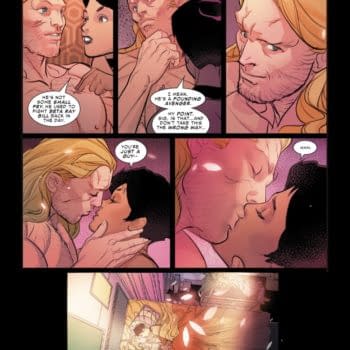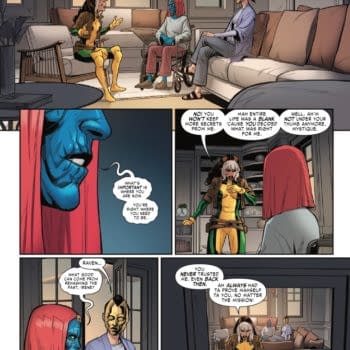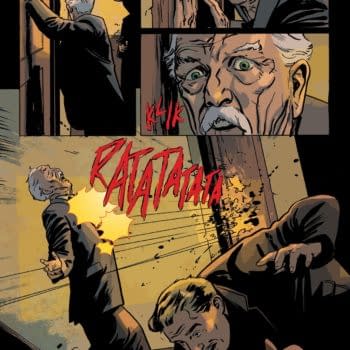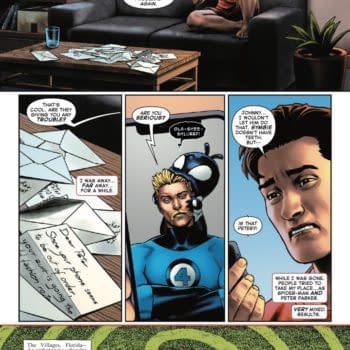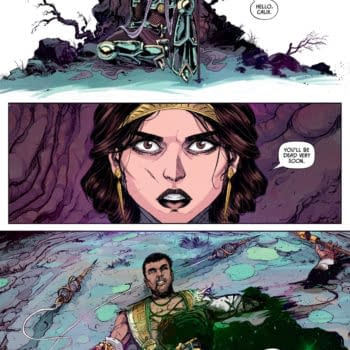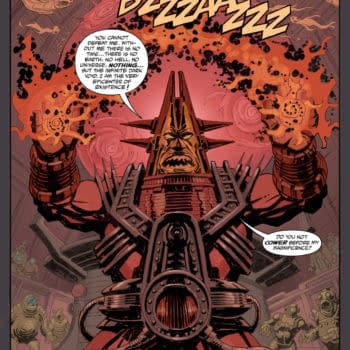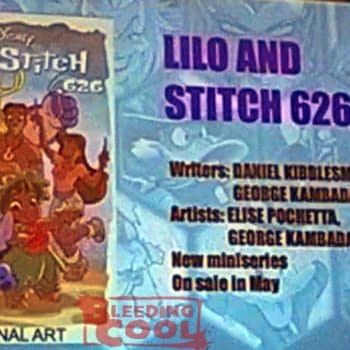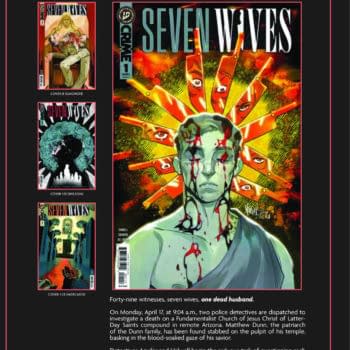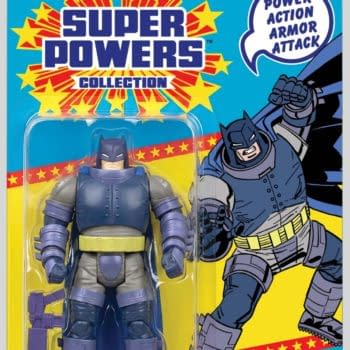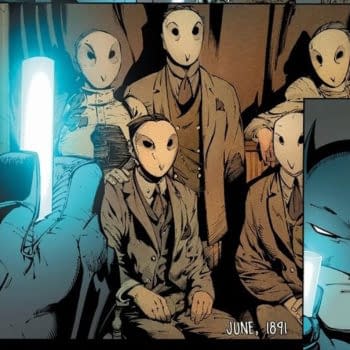Posted in: Comics | Tagged: greg anderson elysee, is'nana the were-spider
Greg Anderson Elysee Talks Breaking Into Comics, Fighting For Diversity, And His Book Is'nana The Were-Spider
For about a decade before coming to work here at Bleeding Cool, I've had the pleasure of working in the esteemed field of comics journalism alongside Greg Anderson Elyesee, and hopefully Bleeding Cool will one day poach him so we can work together again (kidding) (kind of). Greg is the author of the recently published Is'nana The Were-Spider with Walter Ostlie, Lee Milewski, and Joshua Cozine, a comic which was successfully funded on Kickstarter which you read about during the campaign right here on Bleeding Cool.
Accidentally breaking a barrier between our world and theirs (called THE MOTHER KINGDOM), Is'nana, the son of Anansi (The West African God of Spiders) accepts the responsibility for releasing creatures of horror into our world, villains who want nothing more but to cause chaos and mayhem to achieve their own diabolical or selfish goals. With guidance from his father, Is'nana not only strives to live up to his father's name but to also reach his own potential while he seeks to discover his individuality and place in the world.
You can pick up a copy of Is'nana the Were-Spider on Amazon or PeepGameComix.
In addition, Greg currently writes a long-running column over at The Outhouse called (Heard It Thru) The Griotvine, which covers a wide range of subjects, one of the most prominent of which is the discussion of diversity and representation in comics, and the backlash against it. I spoke with Greg about these topics and about his journey from comics fan to creator. Give it a read below.

I've wanted to be a comic book creator since I was a little kid. I used to make books and staple them together. It's been my number one dream. I remember one day, being a pre-teen, finding the number of DC Comics offices and calling them to ask for a job and how I had some cool Batman ideas. Haha! This is the first time I've ever told anyone this.
Growing up, what made you want want to make comic books?
I love art and I love reading, ever since I was a kid. I was obsessed with Greek mythology and I suppose I see comic books and superheroes as modern mythology. The designs, the history, the stories. Nothing appeals to me the same way comics do. It's like an addiction and I always want to learn more, as both a writer and reader.
Did you have any support?
My parents have been my biggest supporters. They never discouraged me when it came to my love for comics and they encouraged me to pursue my love for writing. My siblings, all my friends, partner, everyone around me have been crazy supportive.
You finally had a big success this year with Is'nana The Were-Spider, your first published book. You raised almost $10,000 on Kickstarter, you published the book, you've been doing signings, it's well-reviewed… How does it feel?
It feels awesome, man. This is only the beginning of the journey, there's still so much left to do! But it feels great. It's especially great when I'm finding myself at conventions, events, hangouts, and dinners with creators I've looked up to and obsessed on for years and they in turn tell me how they know me and seen my work, etc.
What made Is'nana the right book at the right time for you to have your first breakthrough?
People are looking for something new and different. And the past few years, more and more people of color have been looking for more and richer representation when it comes to geek work. Look at how much Luke Cage has blown up and how excited people were about Black Panther. More work from the Black Indie scene is also blowing up, books like Watson and Holmes, Horizon, Niobe, The Pack, Bounce, Black, Malice in Ovenland, and so on. People want diversity and when it comes to diversity many are ready to support them. I call this current era the Year(s) of Black Comic Renaissance. I was fortunate to be doing Is'nana around this same time when people are looking for fresh products of color.
What did you learn on your journey that you can pass on to others?
Save every nickel, work harder than hard, keep an open mind, don't burn bridges, and estimate a lot more than you think you need when doing a Kickstarter.
Is'nana draws on African mythology. How did you discover this mythology – did you grow up with it? – and what makes it ripe for storytelling today?
I got into Black mythological characters towards the tail end of High School. I didn't grow up on any of those stories. I just knew the typical European fairy tales and some White American folklore and of course Greek and some Norse mythology. But one day I found a book that introduced me to Haitian folktales and characters and in college I took a few African diaspora classes that introduced me to other characters from Africa and African American stories and some Caribbean. The rest I read up on my own. I find it disheartening that a lot of people, and Black people especially, aren't aware of a lot of these characters and just how fresh and different they are compared to the "traditional" stories we are taught growing up in school. With Is'nana, I want to present a gateway to readers to learn that there are a lot of Black characters out there and that we can do so much with them.
There are a lot of comics and comics-adjacent projects that draw on mythology, most often European mythology, maybe Native American mythology too. But the most well-known geeky thing I can think of that's based on African mythology is Neil Gaiman's Anansi Boys. Because of the scarcity of the subject matter, where these might be the only two projects someone knows that draw on that mythology, do you get a lot of unfair comparisons to that book?
I love Anansi Boys and I love Neil Gaiman's work. Anansi Boys is one of my favorite books ever and I want to be the one directing the film adaption. I have had many people ask me if I was inspired by that book or have read it. I have read it, obviously, but I was not inspired by it. Aside from the usage of the Anansi tales and it focusing on his sons, there really isn't much similarities between that book and mine and I'm sure once you read it, you'll see that. I'm not upset about it, the comparisons. I think it's a common and understandable connection, especially given how popular Gaiman is, but I do enjoy my name and work being mentioned next to Gaimen, haha.
That being said, I did say on my social media I wanted to get Orlando Jones a copy of Is'nana the Were-Spider since he'll be playing Is'nana's daddy in American Gods! Help me! Haha.

I love the relationship between my father and I. I didn't grow up sharing a house with him, but he made sure to be there for me as much as possible and I was always at his place every vacation as a kid. This book is sort of an ode to him. Our personalities may not be as similar to Anansi and Is'nana in this book, but the love they share for each other despite their differences in personalities and beliefs I used as inspiration from my pops and I. I hope to write some stuff with Is'nana and his mother in the near future. I feel a lot of times, we don't get to see a lot of strong family stories when it comes to Black characters in a lot of geek stories. There's a few we can pinpoint and bring up but they're far and in between compared to the status quo geek products out there. I love reading relationships in fiction, and I want to write a loving and positive Black relationship (even though one is a literal spider).
Do you plan to be a father someday? Did the process of creating a work about father/son relationships affect how you feel about that?
I do want to be a father. No time soon, but I do want to be a father. Writing this has in fact made me think about the relationship I may have with my child, especially writing volume 2 where both characters end up being at odds with each other. I tried to write from both points of view where neither were wrong but that didn't mean they saw eye-to-eye due to being in their own shoes.
You write a column for TheOuthousers.com, The Griotvine, one of the primary focuses of which is spotlighting diverse artists. Why is that important, and who are some of the people you've interviewed (and what did you talk about)?
Growing up as a person of color and also a geek, I always found myself wanting to see more characters of color. Watching X-Men: The Animated Series, I got so excited when Bishop was introduced. At the time, I never knew Black superheroes existed aside from Bishop and Storm. I knew all the big guys: Batman, Superman, Wonder Woman, Spidey. As I got older, I learned about more Black characters and eventually that led to learning about a lot of Black creators in the comic book world. While there are a good select creators of color in the comic book world, there are many creators outside of Marvel and DC who work their asses off to get characters of color who are shown as three dimensional products while people, readers find themselves begging for more diversity from Marvel and DC. For over a decade I've fallen in love with independent comics and that eventually led to my love for Black indie comics. My intention with (Heard It Thru) The Griotvine was to introduce people to a lot of those creators given they may not get the same type of coverage as other creators in the business. I've also tried to get creators and artists from outside of the comic world. I've interviewed amazing creators like John Jennings, David Walker, Tim Fielder, Nikki Michelle, James C. Lewis, Micheline Hess, Joe Illidge, and so on.
When we were last working together, in October, Donald Trump was widely believed to be definitely going to lose the presidential election. That didn't happen, which shocked a lot of people. Did it shock you? What affect do you think that has on the work you've been doing with these interviews, and the fight for a more inclusive comics community in general?
Funny you ask that because I wrote a piece recently for the column concerning the aftermath of the election and how it's affecting people and how my creator peers need to band together more so than before. I'm not entirely too sure if it shocked me but I was disappointed. That disappointed turned into anger on my end and made me lose faith in the country even more than I had before while losing faith in people I could call friends. It may not affect my own writing, at least for now, but it's driven me to ensure I get more work out as soon as I can. I've seen online people are losing more and more faith being a person of color or of a different sexual orientation and they're scared and they're being attacked. We, as creators of art, people who are generally lovers of stories that talk of peace and justice, we need to band together and be there for the people who lose faith and inspire them to persevere. I've lost track a little with The Griotvine due to getting busy with other projects and personal life, but I've made a deal with myself to get back on it and do my part.
From a professional perspective as a person who addresses topics related to diversity and representation in your journalism work, and from a personal perspective as a creator and a fan, how does it positively affect comics?
Hmm. Well, authenticity. I think with the proper care and the proper research, anyone can do well to write all types of characters and stories. But I feel many times, the best people with similar backgrounds of the character(s) or story they're writing tend to lead to stronger, richer stories. Let's use Steve Orlando as an example, writing Midnighter for DC Comics. Midnighter has never been better. Anyone can quote me on that. But no one has written Midnighter as dynamic and three dimensional as Orlando has and I do feel a lot of it is due to Orlando being a bisexual man and knowing what he'd love to see in a mainstream superhero comic with a gay lead. And let's use Christopher Priest as the writer of Black Panther. As much as he hates to be pigeonholed as "The Black writer who writes Black characters," his voice as a Black man helped add a nuanced dimension to T'Challa and his mythos that no other writer had done before.
So I can say my identity and advocacy for diversity would allow me to present stories and ideas that many people may not know or have been introduced to before, whether it's characters or storytelling or what's generally considered "the norm." I have some other projects in the works that I hope will challenge what's considered "the norm" and I feel I'm definitely the cat to do that.

Ignorance, man. That's the reality of it and it's extremely unfortunate. And people seem to live, thrive, and love the ignorance they live in. You'd think with all the resources and knowledge at our fingertips, something as simple as empathy would be extremely easy to practice. But systematic oppression, the need and desire to be above and stronger than someone… when people underneath want a piece of the pie, suddenly the ones above, the ones with the most representation feel that they are being attacked and are suddenly the victims. It's pretty disheartening and it's gross. For years people of color and different sexualities have been begging for fairer, better, and more representation, especially when most geek products are overrun with white, straight characters. Damn near EVERY piece of work and at most you'll get ONE token person of color or LGBTQ character. People of the majority will find nothing wrong with that. But suddenly they see the cast of Black Panther coming out in 2018 or the cast of the Luke Cage Netflix show, and suddenly they feel unrepresented and want to start arguments. Haha. I just laugh at their bigoted ignorance.
Is progress being made?
There's progress and there isn't. I feel more people of color are realizing they don't have to be begging for scraps as much and there are products and businesses out there that can cater more to their interests. The recent election, I feel, has opened up people's eyes to a lot of messed up personalities and beliefs. Suddenly a lot of white people are shocked and baffled at the racism coming from other whites despite the fact that we, people of color, have been talking about this ALL our lives. There's been a lot of progress with representation in media, in comics. We have Sam Wilson as Captain America. Thor is Jane. And so on. But we know comics. How long will that be the status quo and when will they be relegated to supporting again? Not hating on the Big 2, but it's the truth, and it's the nature of the beast. We move a bit further then suddenly a reboot kicks our asses out to remind us this ain't really set for us like that. I'm hoping I'm wrong. If I'm wrong, I'll be happy and it means solid and authentic work needing to be supported.
What do you see happening next? Is there a point where the battle is won, or will it be fought forever?
I don't know about anyone else but i can say for me, I'll keep on fighting the good fight. I know there's a lot of people who don't give a crap about diversity, whites and people of color alike. And it's whatever. But I know for me, I'll keep on being annoying about it and debating and arguing about it. So if the fight is to last forever, I'll continue to be doing just that till after I'm dead. Heh.
Frank Cho: genius, or asshole?
I'm not getting into more trouble than I am, Jude!
Currently Is'nana Volume 2 is in the works. That's been taking main priority for me. It's going to be a lot denser in story and theme. I'm hoping readers will enjoy it. The art is looking fantastic for it. I hope to make an announcement concerning the book this or next month.
I have other projects in the works but none are close to ready for announcement or release.
Is'nana The Were-Spider: where can people find it, and one last time, why should they want to?
You can find Is'nana: the Were-Spider on Amazon for the print. For digital, you can find it at peepgamecomix.com. If you can track me on social media, you can also just send me a message and we can handle all that fun transaction thingy.
They should want it because it's awesome! Heh. It's a fun horror/fantasy coming of age story about the son of a God who strives to live up to his father's legacy while hoping to be his own individual and find his place in the world. It touches on themes of forgotten legacy and also draws inspiration from Black/African mythology in a modern setting that I feel hasn't been done before. It's the beginning of what I hope to be a touching father and son story, of love, appreciation, and respect. The art is amazing and I am extremely proud of my creative team. It'd be a shame not to be exposed to their amazing work!
Is it okay to punch Nazis?
Does a spider poop webs?
Thanks so much, Greg.
Thank you so much for having me, Jude! Keep the havoc going!
Buy a hard copy of Is'nana: the Were-Spider on Amazon. Buy a digital copy on PeepGameComix.com. Read Greg's comics journalism work at TheOuthousers.com. Follow him on Twitter, Instagram, and Facebook.








